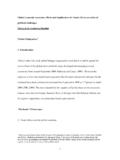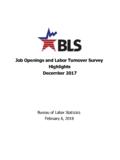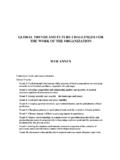Transcription of BRAZIL - OECD.org
1 3. DEVELOPMENTS IN INDIVIDUAL OECD AND SELECTED NON-MEMBER ECONOMIESOECD ECONOMIC OUTLOOK, VOLUME 2018 ISSUE 2 PRELIMINARY VERSION OECD 201879 BRAZILG rowth will gain momentum during 2019 and 2020 as private consumption,supported by improvements in the labour market, will increase. Recovering credit andgreater policy certainty as a new administration takes office will buttress the uncertainty around the implementation of reforms remains significant andcould derail the recovery, but if uncertainty fades and reforms advance as assumed,investment will become policy is projected to tighten during 2019 as the economy gathersmomentum. Without a major expenditure reduction, the sustainability of the fiscalaccounts remains at risk, especially due to rising pension spending.
2 Building a politicalconsensus for a pension reform will be an important challenge for the incomingadministration. Maintaining strong growth will require further efforts to strengthenproductivity, including closer integration into the global a temporary setback from a transport strike, the expansion continuesAfter a temporary strike-related setback, growth momentum appears to bestrengthening, supported by recovering credit flows. A repricing of risks in internationalcapital markets has led to capital outflows and a depreciation of the currency, but lowforeign debt exposure has limited the impact on the domestic economy. Inflation and coreinflation are below target and interest rates have remained low, supporting householdspending.
3 Moderate wage growth and improvements in labour markets, though gradual,are adding to private consumption. However, the composition of jobs created has been oflow quality so far, with a disproportionate number of jobs created in the informal the quality of the public finances remains a priorityGross public debt has risen to 77% of GDP and the primary balance of of GDPremains significantly below the estimated +2% required to stabilise public Core inflation is defined as the average of the three core inflation measures published by the Central Bank of :Central Bank of BRAZIL ; IBGE; and OECD Economic Outlook 104 database1 2 Total labour incomeCentral Bank activity indicatorIndustrial productionActivity and wages are recovering036912151803691215182014201520 1620172018Y o y % changes % Inflation (IPCA) Core inflation Policy rate (SELIC) Inflation is around target and interest rates have remained low3.
4 DEVELOPMENTS IN INDIVIDUAL OECD AND SELECTED NON-MEMBER ECONOMIESOECD ECONOMIC OUTLOOK, VOLUME 2018 ISSUE 2 PRELIMINARY VERSION OECD 201880 The deterioration of the fiscal accounts over the past years is mainly due to rising socialsecurity expenditures and this trend is likely to continue without a reform of socialbenefits, most notably old-age pension reform remains the key priority to ensure a stabilisation of public debt overthe medium term and maintain investor confidence in sound public finances andBrazil:Demand, output and prices1 2 &XUUHQW SULFHV %5/ ELOOLRQ*'3 DW PDUNHW SULFHV 3 ULYDWH FRQVXPSWLRQ *RYHUQPHQW FRQVXPSWLRQ *URVV IL[HG FDSLWDO IRUPDWLRQ )]
5 LQDO GRPHVWLF GHPDQG 6 WRFNEXLOGLQJ 7 RWDO GRPHVWLF GHPDQG ([SRUWV RI JRRGV DQG VHUYLFHV ,PSRUWV RI JRRGV DQG VHUYLFHV 1HW H[SRUWV Memorandum items*'3 GHIODWRU B &RQVXPHU SULFH LQGH[ B 3 ULYDWH FRQVXPSWLRQ GHIODWRU B *HQHUDO JRYHUQPHQW ILQDQFLDO EDODQFH RI *'3 B &XUUHQW DFFRXQW EDODQFH RI *'3 B &RQWULEXWLRQV WR FKDQJHV LQ UHDO *'3 DFWXDO DPRXQW LQ WKH ILUVW FROXPQ Source: 2(&' (FRQRPLF 2 XWORRN GDWDEDVH 3 HUFHQWDJH FKDQJHV YROXPH SULFHV Brazil1. Accumulated over 12 :Central Bank of BRAZIL ; and National 2 12 10 8 6 4 2024 12 8 40420142015201620172018% of GDP Interest balance Primary balance Fiscal balanceFiscal outcomes have improved gradually after a significant deterioration 200 1000100 250 200 150 100 5005010015020142015201620172018 BRL billionPrimary balancePrimary balance: social security onlyPrimary balance: all other itemsPension expenditures have contributed to the deterioration of fiscal outcomes in the past 3.)))]]]
6 DEVELOPMENTS IN INDIVIDUAL OECD AND SELECTED NON-MEMBER ECONOMIESOECD ECONOMIC OUTLOOK, VOLUME 2018 ISSUE 2 PRELIMINARY VERSION OECD 201881management of the economy. Increases in pension spending have left fewer resources forsocial benefits to fight inequality and poverty, which is concentrated among children andyouth. The minimum wage serves as a floor for all pension benefits and has increasedrapidly over the past years. As a result, rising pension benefits have benefitted mostlymiddle-class households, while highly effective transfers to poor households havestagnated. Limiting future increases in pension benefits could finance more socialtransfers to the most needy, while putting fiscal accounts on a more sustainable participation thresholds in the conditional cash transfer programmeBolsaFam lia, which costs only of GDP, would also strengthen incentives for schoolattendance and medical check-ups, thus reducing inequalities with respect to educationand health.
7 Efforts to reduce tax expenditures and credit subsidies for private sectorenterprises, which have created fertile grounds for corruption without generating anydiscernible benefits for either well-being or productivity, should designed in response to the recent trucker strike included lower taxes ondiesel fuel and price regulations in cargo transportation services. These measures shouldeventually be rolled back as they have undermined fiscal consolidation efforts, curtailedcompetition and hurt export competitiveness by raising input prices for many othersectors. Diesel fuel was already taxed less than petrol, while environmental considerationswould suggest the contrary. As the CO2intensity of the economy has increased recently,fossil fuel taxes should be raised rather than reduced.
8 Moreover, the poor are most exposedto the negative health effects from air growth will be the main engine of growth in the longer it will require more competition in many sectors to allow labour and capitalto move to activities with strong potential. Closer integration into the global economywould raise efficiency by exposing more firms to foreign competition and improving accessto lower cost intermediate and capital goods. Efficiency would also be enhanced byreducing domestic barriers to entry and implementing policies to reduce costs, such aseasing tax compliance or improving contract enforcement. A substantial overhaul of thefragmented indirect tax system, with a view towards a unified value added tax, could raisethe competitiveness of firms across the is projected to riseGrowth is projected to increase during 2019 and 2020 as low inflation, moderate wagegrowth and falling unemployment support stronger private consumption and reformprogress stimulates investment.
9 As business confidence improves, unemployment isprojected to continue to decline, including through the creation of more jobs in the are mainly related to the implementation of reforms. The fragmented politicallandscape will make it difficult to create political consensus for key reforms, including apension reform, without which public debt is set to rise. While BRAZIL s externalvulnerabilities are limited due to a low current account deficit and a low share of publicdebt denominated in foreign currency, spill-overs from a deterioration of the situation inArgentina are conceivable. Argentina accounts for around 7% of BRAZIL s exports, but is akey destination for industrial exports. The possibility of rising trade tensions also bearsrisks for BRAZIL , as China and the United States are BRAZIL s two major trading partners.
















